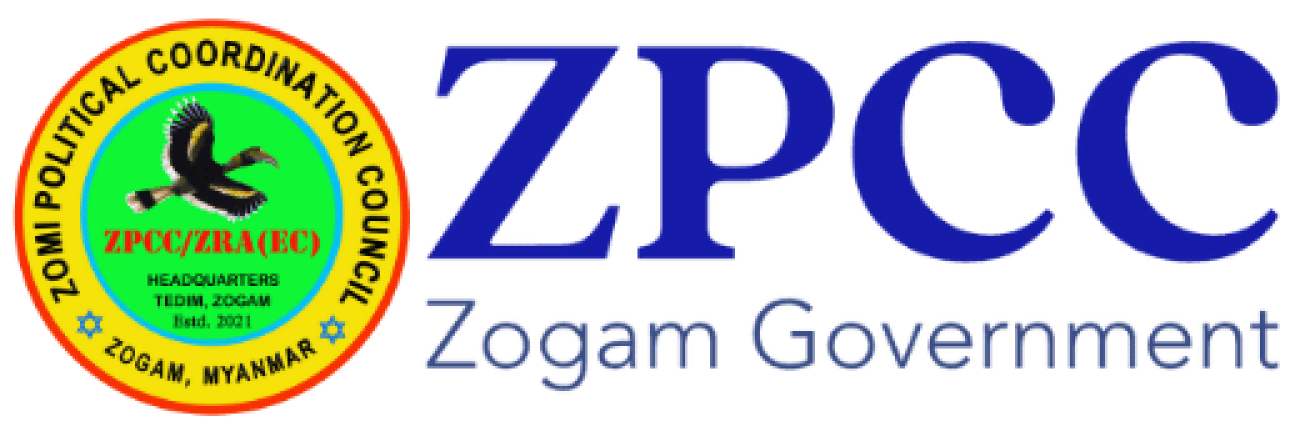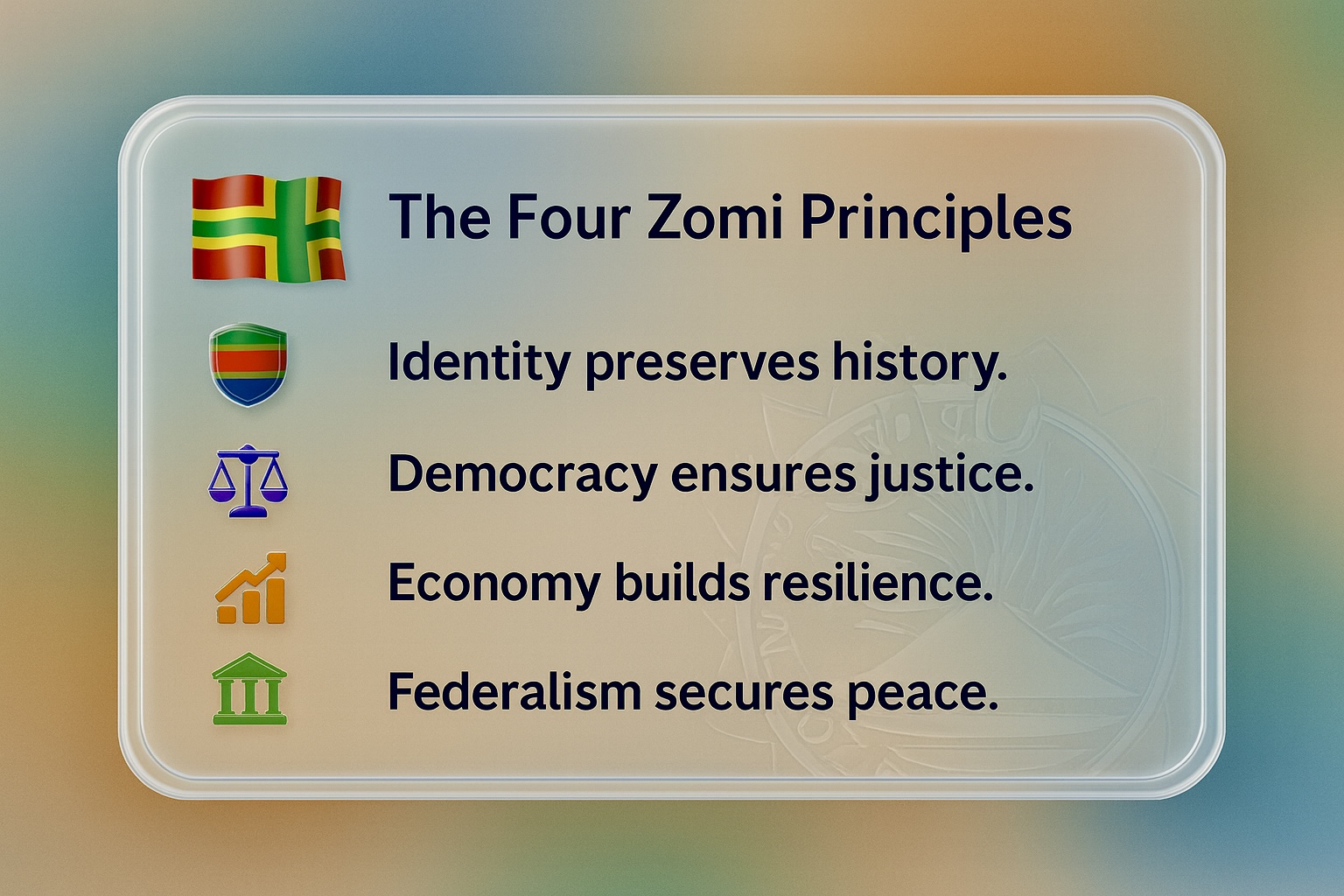The Four Zomi Principles: Pillars of National Development and the Reawakening of a People
Abstract
The Four Zomi Principles — the use of the name “Zomi”, the establishment of a genuine democratic government, the advancement of an independent, market-oriented economy, and the promotion of the Panglong Spirit (Federal) — constitute not only the foundation of Zomi political identity but also serve as universal pillars of nation-building and sustainable development. This article examines their enduring relevance through the lens of history, political philosophy, and socio-economic progress, drawing parallels between the Zomi experience and broader global patterns of liberation and development.
1. The Principle of Identity: “Zomi” as Proof of Ancestry and Nationhood
“We are Zomi — one people, one destiny, one land. When we forget this, we lose not only our name but our nation.”
— Pu Chin Sian Thang, Founder of the Zomi National Congress
The first principle — the use of the name “Zomi” — is far more than linguistic heritage; it is the existential anchor of a people’s legitimacy. In political anthropology, identity forms the core determinant of continuity and cohesion. The assertion of the name Zomi reclaims historical truth from centuries of misclassification and administrative distortion under colonial and post-colonial regimes.
From an academic standpoint, nations that safeguard their native identities display higher degrees of social capital, unity, and moral resilience (Anderson, Imagined Communities, 1983). The Zomi name thus functions as both cultural proof and political evidence of indigeneity — a right recognized under Article 3 of the UN Declaration on the Rights of Indigenous Peoples (UNDRIP, 2007).
For the Zomi nation, this principle asserts that national development must begin with self-recognition. Without identity, governance lacks moral grounding. The reclamation of Zomi strengthens solidarity, inspires confidence, and ensures that future generations inherit not confusion but conviction.
2. The Principle of Governance: The Emergence of a Genuine Democratic Government
“Democracy is not a gift bestowed by the powerful; it is the voice of the governed demanding to be heard.” — Daw Aung San Suu Kyi (1990)
The second Zomi principle — a genuine democratic government — forms the political backbone of national advancement. Democracy, in its truest form, is not procedural but moral. It demands participation, accountability, and justice.
Comparative political research affirms that nations governed by democratic institutions achieve more sustainable development and social stability (Lipset, Political Man, 1959). In the Zomi context, democracy is not imported; it is an inherited aspiration born from the Zomi Congress for Democracy (ZCD) movement of 1988, refined through decades of political repression, and reaffirmed in the Zogam Charter (2021).
The call for democracy among the Zomi is a call for moral leadership, where authority derives from the people and governance operates for their welfare. Democracy is not only about elections; it is about dignity. And dignity, when institutionalized, breeds trust, unity, and innovation — the very engines of development.
3. The Principle of Economy: The Independent Market-Oriented System
“Political freedom without economic freedom is only half a liberation.” — Milton Friedman, Capitalism and Freedom (1962)
The third principle — the independent, market-oriented economy — stands as the pragmatic pillar of the Zomi vision. Economic independence transforms nationalism from sentiment into sustainability.
As global history shows, countries emerging from colonial dependency, such as South Korea and Singapore, advanced through market-oriented models that combined entrepreneurship with governance integrity. Likewise, the Zomi aspiration for a free, responsible market balances individual creativity with community ethics.
The economic philosophy embedded in the Zomi principles aligns with the Federal Democratic Union’s commitment to resource sharing and fiscal autonomy. It envisions Zogam as a self-reliant, production-driven society — investing in education, local industry, and technology, while protecting its natural resources.
In a broader development context, this principle signifies that freedom must feed the people. Economic justice — where every villager, farmer, trader, and craftsman shares in the prosperity of the land — transforms a nation from surviving to thriving.
4. The Principle of Federalism: The Promotion of the Panglong Spirit
“In unity lies strength; in equality lies peace.” — General Aung San, Panglong Conference, February 1947
The Panglong Spirit, the fourth Zomi principle, represents the enduring promise of partnership among Myanmar’s ethnic nationalities — a covenant forged in trust but long betrayed by successive regimes. Yet, to the Zomi, it remains an article of faith.
The Zogam Charter reaffirms this spirit as a living principle — not a historical artifact. True federalism requires equality, mutual respect, and shared responsibility. Political development, in this sense, is inseparable from reconciliation. The Panglong Spirit embodies both: it is the heart of unity and the soul of peace.
Globally, federations that embrace diversity — such as Switzerland and Canada — have proven that ethnic pluralism, when guided by justice, enhances rather than weakens national progress (Stepan, Federalism and Democracy, 1999). The Zomi understanding of Panglong mirrors this ideal: cooperation without coercion, partnership without prejudice, and unity without uniformity.
5. The Zomi Principles as Universal Pillars of National Development
In synthesis, these Four Zomi Principles transcend ethnicity; they express universal truths of nationhood:
- Identity preserves history.
- Democracy ensures justice.
- Economy builds resilience.
- Federalism secures peace.
Together, they form a holistic framework for modern statecraft — one that unites culture, governance, and progress under moral authority. For developing societies, these principles offer a blueprint for transformation — moving from survival politics to sustainable prosperity.
“A nation rises when its people are governed by principles, not by power.”
— Zogam Charter Commentary, ZPCC Media (2022)
The greatness of these principles lies in their balance: they are both moral and material, idealistic yet practical. They affirm that freedom must have structure, and justice must have economy.
The Zomi Vision in a Global Context
As the Zomi people continue their journey toward self-determination, the Four Principles serve not merely as historical slogans but as living instruments of national renewal. They illuminate a path where political wisdom, moral leadership, and community development converge.
Crucially, these four pillars are not new inventions — they are deeply embedded in the very foundation of the Zomi Congress for Democracy (ZCD), which itself evolved from the Zomi National Congress (ZNC). From ZNC’s historic advocacy for ethnic equality and federal democracy to ZCD’s institutionalization of these ideals, the Four Principles have remained the ideological compass of the Zomi political movement.
They continue to inspire the present generation under the Zomi Political Coordination Council (ZPCC) — ensuring that the spirit of Zomi unity, democratic governance, economic independence, and Panglong partnership remains alive and progressive.
In the words of Dr. Martin Luther King Jr. (1963), “A people who refuse to stand for something will fall for anything.”
The Zomi people have chosen to stand for four eternal truths — identity, democracy, independence, and unity.
From these pillars will rise a Zogam that is not only free, but flourishing; not only democratic, but dignified.
References
- Anderson, Benedict. Imagined Communities: Reflections on the Origin and Spread of Nationalism. Verso, 1983.
- Lipset, Seymour Martin. Political Man: The Social Bases of Politics. Johns Hopkins University Press, 1959.
- Friedman, Milton. Capitalism and Freedom. University of Chicago Press, 1962.
- United Nations. Declaration on the Rights of Indigenous Peoples (UNDRIP). 2007.
- Stepan, Alfred. Federalism and Democracy: Beyond the U.S. Model. Journal of Democracy, 1999.
- Zogam Charter, Articles II–IV. Zomi Political Coordination Council (ZPCC), 2021.
- Zogam Charter Commentary. Department of Information and Media, ZPCC, 2022.
- Thang, Pu Chin Sian. Zomi Identity and Democracy: Collected Speeches. Zomi National Congress Archives, 1995.


